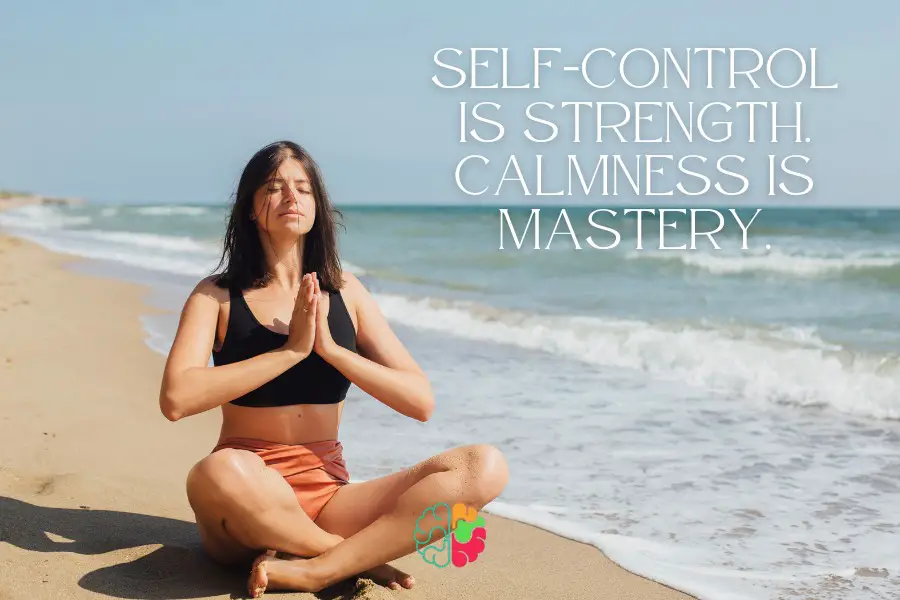Self-control is a difficult endeavor, but it is essential in order to achieve success. It is the ability to regulate one’s own emotions, thoughts, and behavior in order to achieve a desired goal. It is not easy to maintain self-control in all circumstances; however, it is important to practice it in order to gain mastery.
What is Self-Control?
Self-control is the ability to maintain a sense of control and composure, even in challenging and difficult situations. It is the ability to restrain oneself from impulsive behaviors and instead choose to act in a way that is beneficial to oneself and others. It is an essential skill to have in order to make well-thought-out decisions and be successful in life. Self-control is a form of emotional intelligence – the capacity to be aware of, control, and express one’s emotions, and to handle interpersonal relationships judiciously and empathetically. It is the capacity to exercise self-discipline and to resist the temptation of instant gratification.
It involves delaying gratification of wants or desires in order to achieve a greater goal, such as working hard to get good grades in school or saving money for a house. Self-control is a key component of success in both personal and professional lives and is necessary for happiness, health, and social well-being. The phrase “Self-Control Is Strength. Calmness Is Mastery” emphasizes the importance of self-control in order to achieve success in life. Self-control requires inner strength and the ability to remain calm, even in the face of adversity. By mastering self-control, one can become a more effective leader, more successful in achieving their goals, and more content with their life.
Why is Self-Control Important?
Having self-control is an important life skill that many of us don’t prioritize. Self-control is the ability to control our own thoughts, words, and actions in order to achieve our goals. It helps us stay focused and remain motivated, even when faced with difficult choices or when tempted to do something that isn’t in our best interest. While it can be difficult to practice self-control, it is a skill that can be developed with practice and can have significant benefits.
Why is self-control important? Self-control helps us make better decisions, manage our emotions, and handle difficult situations. It can help us stay on task and be more productive while avoiding procrastination. It can also help us stay calm and focused during stressful times. By having self-control, we can make better decisions, handle difficult emotions, and stay in control of our behavior. This can help us achieve our goals, build better relationships, and be more successful in life. Ultimately, having self-control is a key to living a happy and balanced life.
Strengthening Your Self-Control
Strengthening Your Self-Control is a vital life skill. Self-control is the ability to manage our emotions, thoughts, and behavior in times of difficulty. It can help us make better decisions and stay on track with our goals. The quote “Self-Control Is Strength. Calmness Is Mastery. You” from Tymoff is a reminder of the power of self-control. Self-control is about more than just willpower – it’s about understanding ourselves and our reactions to stress, and learning the skills to stay calm and focused in challenging situations. By developing our self-control, we can become masters of our own lives, instead of being controlled by external factors.
One way to strengthen our self-control is through mindfulness. Mindfulness is a practice of focusing on the present moment and taking time to observe our thoughts and feelings without judgment. It helps us to gain awareness of our emotional reactions and better understand our triggers, allowing us to make wiser decisions in difficult situations. Additionally, mindfulness can help us to cultivate a more positive outlook, and reduce stress and anxiety.
Another way to strengthen our self-control is to practice self-compassion. Self-compassion involves being kind and understanding towards ourselves, instead of beating ourselves up for our mistakes. It can also help us to stay motivated and focused on our goals, rather than getting bogged down in self-criticism.
Finally, developing a solid routine can help us to stay on track and practice self-control. Routines can help us to maintain a sense of control and structure in our lives, as well as providing a sense of security and stability.
The Benefits of Self-Control
Having self-control can bring many benefits to our lives, both physically and mentally. It allows us to manage our emotions and reactions to the world around us, enabling us to better handle the challenges life throws our way. Self-control is the strength to resist temptation and to stay focused on our desired goals. It helps us to remain calm and composed in moments when our emotions could otherwise take over. In this way, self-control is a form of mastery over our own lives and a powerful tool for achieving success. Being able to exercise self-control gives us control over our decisions and life path, allowing us to make better choices and ultimately achieve our goals. This is why it is important to practice self-control, as it can have a positive impact on our overall well-being and help us to reach our full potential.
Calmness and Mastery
Having self-control is a sign of strength and having a calm demeanor is a sign of mastery. This quote by Tymoff speaks to the power of having control over yourself and your emotions. To be able to remain calm and collected in any situation is a difficult feat, but it is a skill that can be learned and developed over time. It is the key to mastering yourself and your emotions, and ensuring that you remain in control of the situation. By developing self-control, you can make sure that you remain focused on the task at hand, rather than being driven by your emotions. Being able to maintain a calm and collected attitude will also help you to remain open to new ideas and perspectives, allowing you to evaluate situations objectively and make better decisions.
Self-control is also key to developing strong relationships. By being able to maintain a calm attitude, you can stay open to constructive criticism and learn from any negative feedback. You are also able to stay focused on the positive aspects of the relationship and remain open to compromise and understanding. Self-control allows you to remain calm in the face of conflict, which can help to deescalate a situation and allow for a more productive dialogue.
Having self-control and a calm demeanor can also help to improve your physical and mental health. By being able to manage your emotions, you can reduce stress and anxiety levels and improve your overall well being. When you are in control of your emotions, you are also better equipped to handle difficult situations, as you can take a step back and assess the situation objectively.
Developing Calmness and Mastery
The old saying “self-control is strength, calmness is mastery” is an important reminder of the power of patience, control and inner strength. It is also a reminder that one can become a master of their own life by developing a calm and controlled attitude. With a little focus and discipline, it’s possible to develop the ability to remain calm and in control even in difficult situations. Developing calmness and mastery is about learning to be in control of one’s emotions, rather than letting them take control of us. This means being aware of one’s thoughts and feelings, recognizing what triggers them, and understanding how to respond without letting emotions dictate the outcome.
Developing calmness and mastery also involves learning to be comfortable with uncertainty and learning to be flexible and adaptable to change. It means learning to trust ourselves and our intuition, as well as learning to trust the process of life. Finally, developing calmness and mastery means learning to take a step back and look at the bigger picture to make decisions that are in alignment with our values and goals. With these skills, one can become a master of their own life, showing strength and resilience in the face of adversity.
Benefits of Calmness and Mastery
Calmness and mastery are two essential elements of a successful and satisfying life. There are numerous benefits of mastering and cultivating calmness, both in terms of physical and mental health. When we cultivate calmness, we are better able to access our inner strength and wisdom, allowing us to make decisions with clarity and confidence. We also become more aware of our own emotions, enabling us to better handle challenging situations. With a calm and rational mind, we can practice self-control and stay focused on the task at hand.
In addition, mastering the art of calmness allows us to live in the present moment and appreciate the beauty of the world around us. When we are able to take a step back from the chaos of life and observe it from a place of calmness and stillness, we can more easily recognize opportunities and develop creative solutions. Through mastery of the art of calmness, we can lead a life of greater balance and contentment.
Conclusion
“Self-Control Is Strength. Calmness Is Mastery. You – Tymoff” is an important reminder that we should strive to have self-control in order to be successful in life. Self-control is a form of strength that helps us to stay focused and stay on task, while calmness is a form of mastery that helps us keep our emotions in check and improve our decision-making skills. Having self-control and calmness are both essential for achieving success and mastering life. By developing self-control and the ability to stay calm in any situation, we can make better decisions and live a more fulfilled life.






